Tous les Matins du Monde Blu-ray Movie
HomeTous les Matins du Monde Blu-ray Movie 
All the Mornings of the WorldEntertainment One | 1991 | 115 min | Unrated | Nov 19, 2013
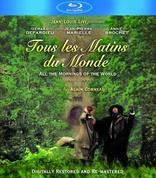
Movie rating
7.5 | / 10 |
Blu-ray rating
| Users | 4.3 | |
| Reviewer | 4.0 | |
| Overall | 4.2 |
Overview
Tous les Matins du Monde (1991)
It's late 17th century. The viola da gamba player Monsieur de Sainte Colombe comes home to find that his wife died while he was away. In his grief he builds a small house in his garden into which he moves to dedicate his life to music and his two young daughters Madeleine and Toinette, avoiding the outside world. Rumor about him and his music is widespread, and even reaches to the court of Louis XIV, who wants him at his court in Lully's orchestra, but Monsieur de Sainte Colombe refuses. One day a young man, Marin Marais, comes to see him with a request, he wants to be taught how to play the violin.
Starring: Gérard Depardieu, Jean-Pierre Marielle, Anne Brochet, Michel Bouquet, Jean-Claude DreyfusDirector: Alain Corneau
| Music | Uncertain |
| Foreign | Uncertain |
| Biography | Uncertain |
| Drama | Uncertain |
| Romance | Uncertain |
Specifications
Video
Video codec: MPEG-4 AVC
Video resolution: 1080p
Aspect ratio: 1.66:1
Original aspect ratio: 1.66:1
Audio
French: DTS-HD Master Audio 5.1
French: Dolby Digital 5.1
Subtitles
English
Discs
50GB Blu-ray Disc
Single disc (1 BD)
Playback
Region A (C untested)
Review
Rating summary
| Movie | 4.5 | |
| Video | 4.0 | |
| Audio | 4.5 | |
| Extras | 2.5 | |
| Overall | 4.0 |
Tous les Matins du Monde Blu-ray Movie Review
Sunrise, Sunset.
Reviewed by Jeffrey Kauffman December 2, 2013The next time you listen to a piece of classical music written before, say, the early 1980s, I’d like you to think about one thing—someone had to not only think up all of that music, they had to notate it. Musical notation is a rather arcane art and one that is incredibly complex at times. Notated music is in its own way a graph of sound and time, and when one also factors in elements like orchestration (which instruments play which notes) and more technical aspects like transposing instruments (some instruments read one note but the sound emanating from them—called concert pitch —is different), the complexities accrue and the mere fact that anything has been notated becomes something of a minor miracle. When the sheer numerical output of prodigious composers like Mozart or Bach or Haydn is taken into account, or even the sheer immensity of composers with perhaps fewer opuses to their name but no less actual music, Richard Strauss and Gustav Mahler springing instantly to mind, the triumph of human will to create Art becomes almost heroic (a none too subtle subtext of Strauss’ own Ein Heldenleben). Simply think of the time it must have taken for Bach to write all of that liturgical music (which he cranked out on an almost daily basis) or for Strauss to assemble his gargantuan tone poems. All of that handwritten turmoil ended with the advent of MIDI (Musical Instrument Digital Interface) in the eighties, when suddenly hooking a MIDI enabled keyboard up to a computer with notation software made getting music “written” down a lot easier—at least in theory (as anyone who has used notation software will attest, the “logic” behind its transcriptions, especially with regard to piano scores, is somewhat cumbersome). While notation itself isn’t a major plot element in the award winning Tous les Matins du Monde (All the Mornings of the World), the physical fortitude it takes to both write and perform music is definitely part of the subtext of this story, based on historical musicians about whom little is actually known. Tous les Matins du Monde makes an interesting companion piece to Amadeus, even if this film’s two musicians are not as iconic as Mozart and Salieri (and let’s face it, Salieri is only iconic because of Amadeus). Both films possess a kind of elegiac quality, and both deal with the memories of a now elderly musician pondering the end of his life and looking back on events of decades earlier. There’s little of the brittle acerbity of Amadeus in Tous les Matins du Monde, but that actually tends to make the French film a more instantly compelling emotional experience.

Marin Marais was a real life composer and viola da gamba master who lived from 1656 to 1728. Marais studied composition with Jean-Baptiste Lully, but he also evidently took a “master class” of sorts in viol playing from his era’s most recognized master of the instrument, Monsieur de Sainte-Colombe. Tous les Matins du Monde fictionalizes this relatively brief interlude in these two musicians’ lives, while at the same time showing the ripples their interchange created which spilled out into both of their subsequent lives. The film is told from the perspective of an elderly Marais (Gerard Depardieu), whom we first see listening to a bunch of viol students attempting to play one of his pieces, none too successfully. Marais gives a rather philosophical speech about shadows and then ironically asks that the curtains be closed so that he can recount an important anecdote from his past in semi-darkness. The film then ventures back several decades, and while Marais is still the narrator, the film delves first into the history of Sainte-Colombe (Jean-Pierre Marielle).
Sainte-Colombe is an odd man who reacts badly to the death of his wife. He looks askance at his two young daughters, at one point locking them in his home’s cellar and forgetting about them. Later, though, it’s shown that Sainte-Colombe, for all of his gruffness, actually does have some feeling for his girls, and he not only instructs them in music, he makes them part of his performances before various courtiers. Daughters Madeleine (Anne Brochet) and Toinette (Carole Richert) grow into young beauties who also are quite talented on the viol, and the Sainte-Colombe family’s performances soon capture the attention of the King, though Sainte-Colombe’s hermetic tendencies cause him to refuse the monarch’s entreaties to come play at court.
Into this emotionally crippled atmosphere a young would be viol student named Marin Marais (Guillaume Depardieu, Gerard’s real life son) wanders, throwing the house into a fair degree of disorder. Sainte-Colombe is initially unswayed by the young man’s talents, complimenting him on his technical merits while at the same time telling him he is not a musician. The Sainte-Colombe girls on the other hand seem to be swayed by something, though it’s debatable as to whether it’s solely Marais’ instrumental acuity. (In one of the film’s most Gallic moments, Marais gives a monologue to Sainte-Colombe and the girls where he laments the day his voice changed and he was booted out of the King’s boys’ choir. Smack dab in the middle of this plaintive rant is a direct self reference to Marais’ “thick” manhood.)
Marais’ relationship with Madeleine ultimately throws Sainte-Colombe for too much of a loop, leading to a series of roiling dramatic developments. But ultimately the story is less about lost love than it is the oft told tale of Art versus Commerce. Sainte-Colombe has already shown he is all about Art. He shuts himself away in a tiny shack on his expansive property, where he spends untold hours playing his specially equipped instrument (seven strings instead of the typical six) and lovingly transcribes his improvisations into a large red notebook, often under the watchful eye of his spectral wife. Marais on the other hand wants success, and ultimately gives in to the lure of the court, with all its finery and riches. Much like Salieri in Amadeus, the elderly Marais is left to look back on a life where the road not taken beckons with even more alacrity now that a once seemingly unlimited supply of mornings has dwindled to a precious few.
Tous les Matins du Monde is a slow, thoughtful meditation on the lure of fame and fortune, suffused with a melancholic subtext of romance gone awry. The film is gorgeously shot by Yves Angelo, who rightfully won the French César (that country’s equivalent to our Academy Awards) for his cinematography. But as sumptuous as the visuals are, it may in fact be the music—stunningly arranged and played by Spanish viol master Jordi Savall (Savall also took home a well deserved César for his efforts). The music wafts through this story like a sinuous breeze, infusing everything it touches with warmth and heart. Just remember as you listen to picture the effort it took to write it all down.
Tous les Matins du Monde Blu-ray Movie, Video Quality 
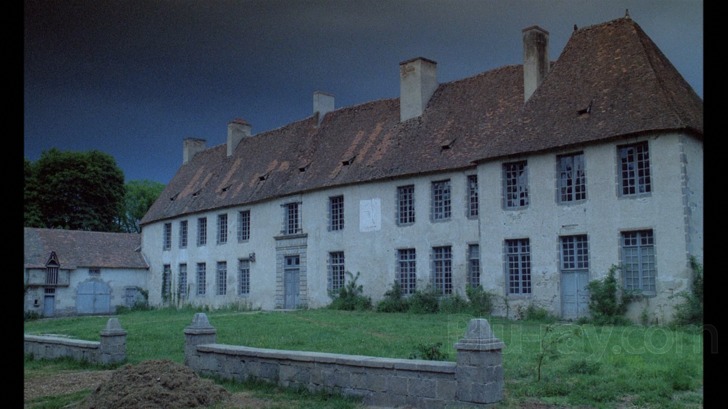
Tous les Matins du Monde is presented on Blu-ray courtesy of Entertainment One with an AVC encoded 1080p transfer in 1.66:1. This is a nicely natural looking presentation which maintains the soft, diffused lighting that director Alain Corneau and cinematographer Yves Angelo favor. The film is gauzily soft most of the time—intentionally so. That said, fine detail is quite commendable, showing individual puffs of powder on faces and the finery of some of the costumes. A lot of the film has been shot in what appears to be natural lighting, with some deep shadows that are reminiscent of the paintings of Brueghel or Vermeer. While browns and blacks are often emphasized, there are gorgeous pops of color that invigorate the proceedings, including the young Marais' bright red outfit when he first arrives at the household of Sainte-Colombe, or any of the sylvan outdoor scenes, which frequently feature nicely lush looking greens. There are no problematic issues with either sharpening or denoising and there are similarly no compression artifacts of any note (no pun intended).
Tous les Matins du Monde Blu-ray Movie, Audio Quality 
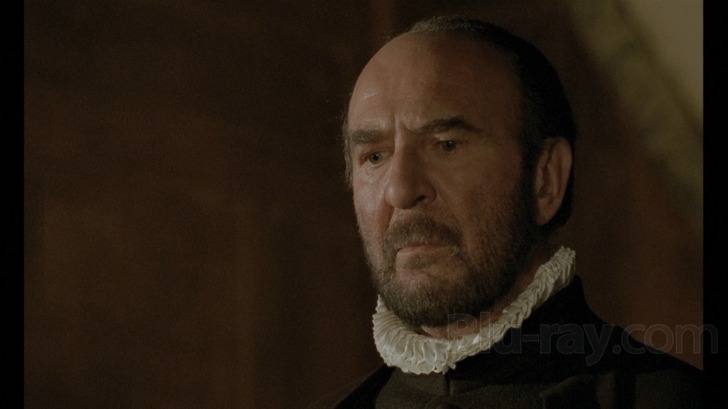
Tous les Matins du Monde features a really resplendent sounding DTS-HD Master Audio 5.1 mix in the original French (with optional English subtitles). The best part of this track is perhaps obviously the music, which spills luxuriously through the surrounds and envelops the film in a deeply burnished ambience. But there is really nice attention paid to sound effects as well—listen, for example, to when Sainte-Colombe opens the door to his little shack and suddenly the sounds of the outside world penetrate the soundfield. Dialogue is very cleanly presented, though is very front centered.
Tous les Matins du Monde Blu-ray Movie, Special Features and Extras 
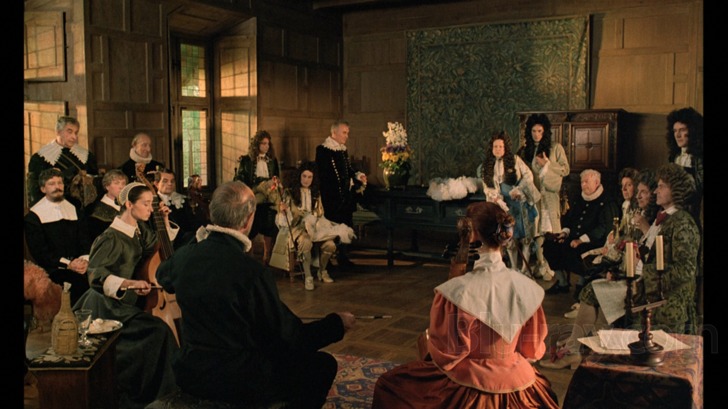
- Making of Featurette (480i; 10:24) is an interesting vintage look at the shooting of the film, with lots of behind the scenes footage.
- Theatrical Trailer (1080p; 1:41)
- Interviews (1080p; 54:19) is a compilation of contemporary interviews with Alain Corneau, Jordi Savall, Jean- Pierre Marielle, and Yves Angelo, interspersed with scenes from the film.
Tous les Matins du Monde Blu-ray Movie, Overall Score and Recommendation 
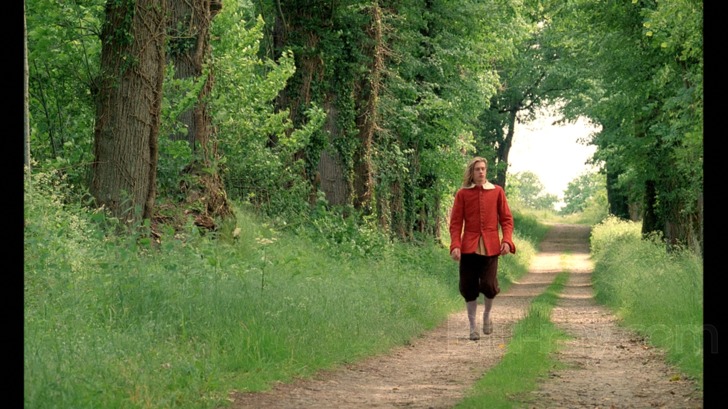
Tous les Matins du Monde swept the César Awards for 1992 (the two mentioned above were only some of the film's accolades), and it's not hard to see why. While there is perhaps an inherently Gallic ambience to the film, its themes (no pun intended) are universal and are easily understood by everyone, even those who wouldn't know a viola da gamba from a cello (and despite what you may read elsewhere, the two instruments are very different). The young Depardieu is fantastic in this film, holding his own effortlessly with the curiously compelling Marielle playing a character who is difficult to love (to say the least). The film is incredibly beautiful from both visual and aural standpoints and this Blu-ray offers a nicely accurate accounting of each. Highly recommended.
Other editions
Tous les Matins du Monde: Other Editions
Similar titles
Similar titles you might also like
(Still not reliable for this title)

La Vie en Rose
La Môme / Warner Archive Collection
2007

Mao's Last Dancer
2009

Farinelli
1994

The Scent of Green Papaya
Mùi du du xanh / L'odeur de la papaye verte
1993

Great Balls of Fire!
1989

La Note Bleue
Limited Edition to 2000
1991

Farewell My Concubine 4K
Original Director's Cut | 霸王别姬 | Bà wáng bié jī
1993

The Band's Visit
2007

Get on Up
2014

Blinded by the Light
2019

A Star Is Born
2018

Saturday Night Fever 4K
45 Year Anniversary | Theatrical Cut / Director's Cut on standard Blu-ray
1977

Lady Sings the Blues
1972

Gainsbourg: A Heroic Life
Gainsbourg: Vie héroïque
2010

The Color of Pomegranates
Նռան գույնը / Sayat Nova
1969

We Are Your Friends
2015

Elvis
2022

Judy
2019

A Heart in Winter
Un coeur en hiver
1992

Isadora
1968
